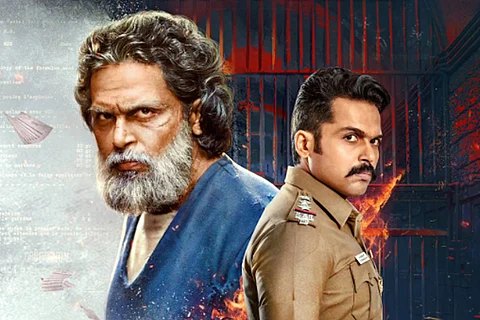

PS Mithran made an impressive debut with Irumbu Thirai in 2018. The film, which was centred on the perils of technology, was a well-made thriller that was mostly entertaining, even if it made some tall and incorrect claims here and there. Then came Hero (2019), which was on the education system and decidedly more lecturish and bizarre than Irumbu Thirai. With Sardar, a spy thriller, he jumps to a conspiracy involving bottled water.
It’s clear that Mithran likes to peg his films on ‘social’ issues that he thinks people should care about. A halo of enlightenment is supposed to develop around our heads as we are eating our popcorn. We’re meant to walk out of the theatre filled with revolutionary zeal. Except, all this is difficult to accomplish when a film has Chunky Panday speaking without any lip-sync 50% of the time.
Karthi plays dual roles – RAW agent Bose/Sardar who was dubbed a traitor by the country, and his son, Vijayprakash, a publicity-hungry cop. Karthi is his jolly self as Vijayprakash but the film labours to establish his character. We’re meant to be amused by Vijaypraksh’s efforts to trend on Twitter but the insipid comedy hardly works. Munishkanth as his uncle evokes some pity chuckles but that’s all. There’s also a romance track with lawyer Shalini (Raashi Khanna) that seems to have been included only because the hero in a Tamil movie has to lose his heart to someone. The songs just make the film longer than it needs to be.
The plot of Sardar revolves around a ‘One Nation, One Pipeline’ project that will link all the water bodies in the country, and make the essential life resource a pricey commodity in the hands of private players. Except an activist called Sameera (Laila) and the 100-odd people she has galvanised, nobody else has seen through what a terrible idea this is (wow). Into this improbable premise, Mithran adds one more bogeyman – horrible lung diseases caused by bottled water.
Laila is a surprising choice for the Erin Brockovich-type ‘water warrior’ character, considering she was stuck in giggly ‘loosu ponnu’ roles when she was playing the heroine. But you aren’t allowed much time to enjoy this new avatar. Two gents who look like they’re stuck in a bad costume party keep interrupting the screenplay; they make calls to each other in morse code, say super secret code names like ‘cockroach’ and are fond of talking about a dude named Sardar who seems like a cross between the Hulk and a T-Rex.
We’re told numerous times how DANGEROUS Sardar is. He’s a ticking time bomb, he’s a nuclear warhead, he’s a rainbow-hued-unicorn-James-Bond. By the time the man appears on screen, you’ve heard so many adjectives about him that it feels like you sat through a Byju’s IELTS course. The ‘entry’ scene for Karthi as Sardar is bombastic but you’re bored out of your skull by this point. The guards at the Bangladeshi prison where this scene is set speak Tamil with a Malayalam accent, while in a later scene, the officers of the Pakistani army speak English with a British accent. I suppose all this is to impress upon us that these people are definitely, definitely foreign.
Karthi looks unconvincing as the older man. He speaks in a growly voice that sounds like Sardar never had access to Vicks drops in all the years he spent in prison, but that’s the only ‘transformation’. The hair and the makeup are badly done, and do little to make us believe that this is a completely different person from Vijayprakash. There’s also a precocious child who runs around with him, doubling up as Google and Wikipedia whenever the situation demands it. This child knows about night vision goggles and such like, but believes in Santa Claus. Aww.
Chunky Panday’s Rathore could have just been called Ravi or Ramkumar and we could have had a Tamil actor who speaks Tamil in the role. But for reasons unknown, we’re expected to put up with the bad lip-sync; this could have been tolerated if the actor didn’t have many lines, but there he is, scene after scene, clearly saying something and us hearing something else.
Mithran’s script is so overstuffed with ideas that none of them has the space to grow. Is this a movie about capitalism? Is it about environmental exploitation? Is it about spies and the service they provide to the country? Is it about India’s troubled relationship with its neighbouring countries? Is it a lecture that we didn’t sign up for? Why make a film in the style of a pamphlet? Why is it so LONG?
The film moves across time periods, shifts from one country to another, and never tires of its ambition to drill information into our brains. Sample this – towards the end, Sardar has only a few seconds to fulfil his mission. But instead of just pushing the damn button or lever, he pauses and says, “Every year, six lakh children die…” By this time, I was rendered so hopeless that I wouldn’t have been surprised if Sardar had said, “Namma ooruku ennadhan aachu?” and talked about tobacco use for the next one hour while the audience slowly gasped for oxygen and shrivelled in their seats.
Exhausting.
Sowmya Rajendran writes on gender, culture and cinema. She has written over 25 books, including a nonfiction book on gender for adolescents. She was awarded the Sahitya Akademi’s Bal Sahitya Puraskar for her novel Mayil Will Not Be Quiet in 2015.
Disclaimer: This review was not paid for or commissioned by anyone associated with the film. Neither TNM nor any of its reviewers have any sort of business relationship with the film's producers or any other members of its cast and crew.